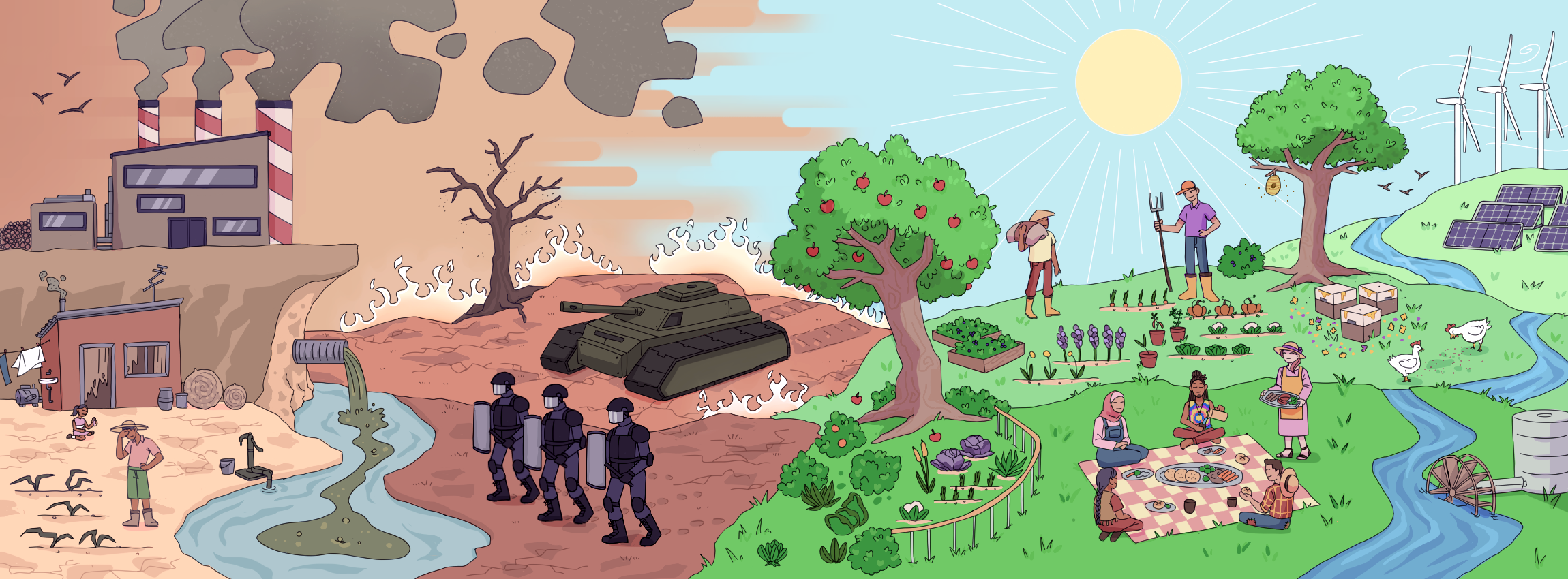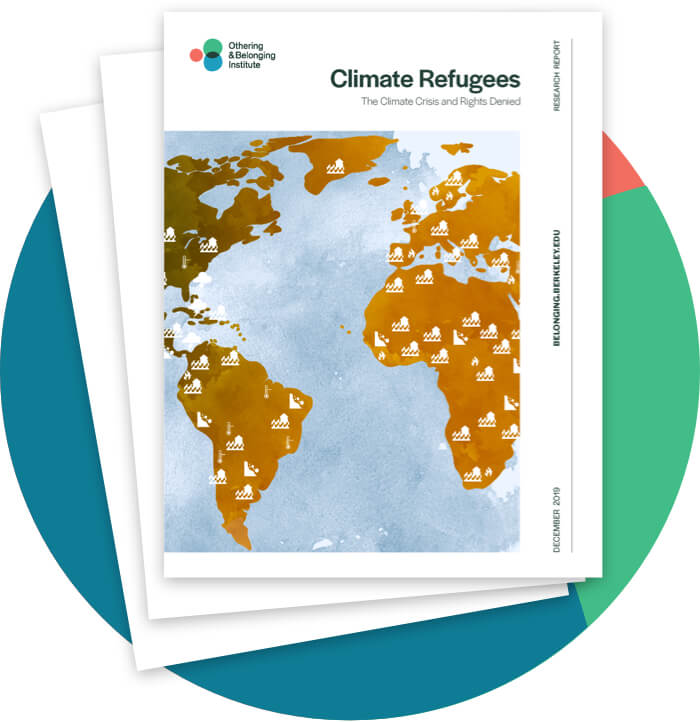Mauritania
Mauritania: A Brief Introduction
Mauritania is located on the West Coast of Africa. Its landscape is dominated by the Sahara Desert. It is experiencing rapid urbanization, and almost half of its 4.7 million inhabitants reside in the coastal capital of Nouakchott.1 Mauritania has a troubled human rights history. It was the last country to abolish slavery, in 1981, and it only criminalized slavery in 2007.2 Today, 90,000 Mauritanians are estimated to live in slavery.3 The largest population group, making up over one-third of the country, consists of Black Africans who do not speak Arabic as a first language. The remainder is composed of Bidan who are of Arab-Berber descent, and Haratin, who are largely descended from sub-Saharan African enslaved people and who are still often victimized by slavery and discrimination.4
Mapping Major Climate Events and Climate-Induced Displacement
International Agencies and NGOs frequently call attention to deforestation and overgrazing as a threat to the Mauritanian landscape.5 Water scarcity puts pressure on Mauritanian herders and on Malian migrants who rely on fishing.6 As of June 2021, almost 80,000 Malian refugees and asylum seekers resided in Mauritania, including 68,000 at the Mbera Refugee Camp located in the southeastern corner of Mauritania at the border with Mali.7 Internal displacement is not extensive in Mauritania. The major drivers of displacement are floods in the wetter south of the country, which displaced about 6,600 people in 2019 and 1,600 people in 2020.8
Mapping the Costs of the Climate Crisis
Concerns about the relationship between environmental degradation and agricultural activities should be interpreted in the context of scholarship that critiques international organizations’ often prejudiced focus on environmental degradation in African contexts.9 Over two-thirds of Mauritania’s cereal supply is imported.10 Furthermore, it must be noted that the service and industrial sectors together accounted for about 68% of Mauritanian jobs in 2017.11 Extractive industries are particularly vital to the Mauritanian economy. The fishing industry accounted for 6% of GDP and 29% of the national budget in 2013.12 Much of this is composed of the over 60 million euros per year in fees paid by the European Union under the current protocol to the EU-Mauritania sustainable fisheries partnership agreement.13 This agreement grants European vessels the right to fish in Mauritanian waters. Despite the name of the agreement, industrial fishing by foreign vessels comes at great expense to artisanal fisheries, which are further threatened by climate change’s effects on marine ecosystems.14 Mauritania also exports large amounts of iron ore, as well as gold and copper. Oil and natural gas have recently become important exports.15 Since 2014, Mauritania’s offshore hydrocarbon reserves have attracted interest from many international oil corporations, including four supermajors.16
Mapping Resilience and Migration Pathways
Mauritania’s economic dependence on natural resource extraction and export, including of fossil fuels, must be factored into any just transitions framework for the country. Mauritania’s NDC notes that energy and agriculture, forestry, and related activities account for the vast majority of Mauritania’s emissions.17 Given its location in the Sahel, a region vulnerable to climate change-induced drought, the NDC calls for habitat conservation, the development of sustainable agriculture, and the protection of fisheries and aquaculture. Mauritania requires foreign funding to achieve its adaptation and mitigation goals. So far, a great deal of WFP funds have gone to supporting Malian refugees in the Mbera Camp.18 International organizations including the FAO are also funding various sustainable agriculture and ecosystem management programs in Mauritania, as in other Sahelian countries.19
Necessary Changes
In many respects, Mauritania is a “rentier state.”20 Its economy is highly dependent on selling natural resources and rights to natural resources to wealthier countries. This puts it in a dangerous situation – the strength of its state coffers and the on-paper condition of its economy are maintained through activities that degrade the environment and interfere with the subsistence livelihoods of Mauritanian people. Most of the fish caught by foreign ships is exported, and much of the remainder is processed into fishmeal at local factories.21 Mauritanian authorities and activists have called for an increased amount of fish intended for export to be sold locally.22 These sorts of market interventions that support Mauritanian communities in the face of environmental change require developed countries to stop fostering the exploitative extraction of fish, ore, and hydrocarbons.
Citations
- 1The World Bank. “Population, total – Mauritania.” Accessed March 24, 2022. https://docs.google.com/document/d/1kC_soU-HyxT9XEM7pSjSFNxCYc0185qo/ed…; UN Department of Economic and Social Affairs, World Urbanization Prospects 2018. “Country Profiles – Mauritania.” Accessed March 24, 2022. https://population.un.org/wup/Country-Profiles/
- 2Human Rights Watch, World Report 2021. “Mauritania; Events of 2020.” Accessed March 24, 2022. https://www.hrw.org/world-report/2021/country-chapters/mauritania?gclid…
- 3Walk Free Foundation. “Global Slavery Index 2018: Africa Region Report.” Accessed March 24, 2022. https://downloads.globalslaveryindex.org/ephemeral/GSI-Africa-Report-16…
- 4Human Rights Watch. “Ethnicity, Discrimination, and Other Red Lines: Repression of Human Rights Defenders in Mauritania.” February 2018. https://www.hrw.org/report/2018/02/12/ethnicity-discrimination-and-othe…
- 5Sabrina Aguiari, Ndiawar Kane, Elizabeth Cuellar. “Decentralised Evaluation of UNHCR’s Livelihood Programme in Mauritania.” UNHCR. March 2020. 7. https://www.unhcr.org/en-us/research/evalreports/5e99cce47/decentralize…
- 6Wachiaya, Catherine. “Warming Climate Threatens Livelihood of Malian Refugees and Mauritanians.” UNHCR. October 30, 2021. https://www.unhcr.org/en-us/news/stories/2021/10/617c4ba66/warming-clim…
- 7UNHCR. “Note on the Identification of Hard-to-Reach Malian Refugees in Mauritania.” August 2021. https://reliefweb.int/report/mauritania/note-identification-hard-reach-…
- 8Internal Displacement Monitoring Center. “Mauritania.” Accessed March 24, 2022. https://www.internal-displacement.org/countries/mauritania
- 9For a thorough, empirical argument that international organizations often misattribute and misidentify deforestation and soil erosion in West Africa, see Bassett, Thomas J., and Koli Bi Zuéli. "Environmental discourses and the Ivorian Savanna." Annals of the Association of American Geographers 90, no. 1 (2000): 67-95.
- 10FAO. “Cereal supply and demand balances for sub-Saharan African countries.” February 2022. 13. https://www.fao.org/documents/card/en/c/cb8895en
- 11International Labor Organization, ILOSTAT. “Country Profiles – Mauritania.” Accessed March 24, 2022. https://ilostat.ilo.org/data/country-profiles/
- 12Marti, Carmen-Paz. “Research for PECH Committee – Fisheries in Mauritania and the European Union.” European Parliament. March 2018. 19.
https://www.europarl.europa.eu/RegData/etudes/STUD/2018/617458/IPOL_STU… - 13European Commission. “Mauritania – Sustainable fisheries partnership agreement with Mauritania.” Accessed March 28, 2022. https://ec.europa.eu/oceans-and-fisheries/fisheries/international-agree….
- 14Ighobor, Kingsley. “Overfishing Destroying Livelihoods.” UN Africa Renewal. 2017. https://www.un.org/africarenewal/magazine/may-july-2017/overfishing-des…
Also see Meissa, B., and Didier Gascuel. "Overfishing of marine resources: some lessons from the assessment of demersal stocks off Mauritania." ICES Journal of Marine Science 72, no. 2 (2015): 414-427. 414. - 15Marti, 15
- 16International Trade Administration. “Mauritania – Country Commercial Guide.” October 2021. https://www.trade.gov/country-commercial-guides/mauritania-oil-and-gas
- 17Ministère de l’Environnement et du Développement Durable. “Contribution Déterminée Nationale Actualisée – CDN 2021-2030.” September 2021. 7.
- 18WFP. “WFP Mauritania Country Brief.” February 2022. https://docs.wfp.org/api/documents/WFP-0000138054/download/?_ga=2.12197…
- 19FAO. “Countries – Mauritania.” Accessed March 29, 2022. https://www.fao.org/countryprofiles/index/en/?iso3=MRT
- 20Magrin, Géraud, Geert Van Vliet, Bopp Van Dessel, and Lucien Chabason. "La Mauritanie et la mer: et si le pétrole aidait à mieux gérer l’insécurité écologique?." Natures Sciences Sociétés 19, no. 3 (2011): 245-255. 245.
- 21Gorez, Beatrice. “Mauritania: A 40-metre seiner authorised to fish on the borders of the Banc d'Arguin.” Coalition for Fair Fisheries Arrangements. September 2021. https://www.cffacape.org/publications-blog/mauritania-a-40-metre-seiner….
- 22Gorez, Beatrice. “Mauritania: A 40-metre seiner authorised to fish on the borders of the Banc d'Arguin.”


